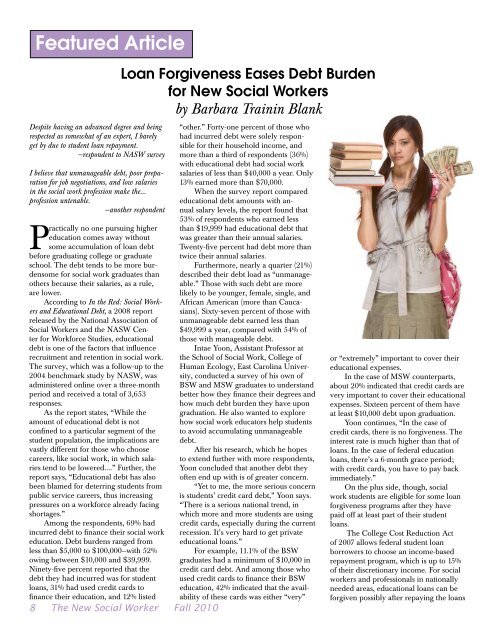In This Issue - THE NEW SOCIAL WORKER Online
In This Issue - THE NEW SOCIAL WORKER Online
In This Issue - THE NEW SOCIAL WORKER Online
You also want an ePaper? Increase the reach of your titles
YUMPU automatically turns print PDFs into web optimized ePapers that Google loves.
Featured Article<br />
Despite having an advanced degree and being<br />
respected as somewhat of an expert, I barely<br />
get by due to student loan repayment.<br />
—respondent to NASW survey<br />
I believe that unmanageable debt, poor preparation<br />
for job negotiations, and low salaries<br />
in the social work profession make the...<br />
profession untenable.<br />
—another respondent<br />
Practically no one pursuing higher<br />
education comes away without<br />
some accumulation of loan debt<br />
before graduating college or graduate<br />
school. The debt tends to be more burdensome<br />
for social work graduates than<br />
others because their salaries, as a rule,<br />
are lower.<br />
According to <strong>In</strong> the Red: Social Workers<br />
and Educational Debt, a 2008 report<br />
released by the National Association of<br />
Social Workers and the NASW Center<br />
for Workforce Studies, educational<br />
debt is one of the factors that influence<br />
recruitment and retention in social work.<br />
The survey, which was a follow-up to the<br />
2004 benchmark study by NASW, was<br />
administered online over a three-month<br />
period and received a total of 3,653<br />
responses.<br />
As the report states, “While the<br />
amount of educational debt is not<br />
confined to a particular segment of the<br />
student population, the implications are<br />
vastly different for those who choose<br />
careers, like social work, in which salaries<br />
tend to be lowered....” Further, the<br />
report says, “Educational debt has also<br />
been blamed for deterring students from<br />
public service careers, thus increasing<br />
pressures on a workforce already facing<br />
shortages.”<br />
Among the respondents, 69% had<br />
incurred debt to finance their social work<br />
education. Debt burdens ranged from<br />
less than $5,000 to $100,000—with 52%<br />
owing between $10,000 and $39,999.<br />
Ninety-five percent reported that the<br />
debt they had incurred was for student<br />
loans, 31% had used credit cards to<br />
finance their education, and 12% listed<br />
Loan Forgiveness Eases Debt Burden<br />
for New Social Workers<br />
by Barbara Trainin Blank<br />
The New Social Worker Fall 010<br />
“other.” Forty-one percent of those who<br />
had incurred debt were solely responsible<br />
for their household income, and<br />
more than a third of respondents (36%)<br />
with educational debt had social work<br />
salaries of less than $40,000 a year. Only<br />
13% earned more than $70,000.<br />
When the survey report compared<br />
educational debt amounts with annual<br />
salary levels, the report found that<br />
53% of respondents who earned less<br />
than $19,999 had educational debt that<br />
was greater than their annual salaries.<br />
Twenty-five percent had debt more than<br />
twice their annual salaries.<br />
Furthermore, nearly a quarter (21%)<br />
described their debt load as “unmanageable.”<br />
Those with such debt are more<br />
likely to be younger, female, single, and<br />
African American (more than Caucasians).<br />
Sixty-seven percent of those with<br />
unmanageable debt earned less than<br />
$49,999 a year, compared with 54% of<br />
those with manageable debt.<br />
<strong>In</strong>tae Yoon, Assistant Professor at<br />
the School of Social Work, College of<br />
Human Ecology, East Carolina University,<br />
conducted a survey of his own of<br />
BSW and MSW graduates to understand<br />
better how they finance their degrees and<br />
how much debt burden they have upon<br />
graduation. He also wanted to explore<br />
how social work educators help students<br />
to avoid accumulating unmanageable<br />
debt.<br />
After his research, which he hopes<br />
to extend further with more respondents,<br />
Yoon concluded that another debt they<br />
often end up with is of greater concern.<br />
“Yet to me, the more serious concern<br />
is students’ credit card debt,” Yoon says.<br />
“There is a serious national trend, in<br />
which more and more students are using<br />
credit cards, especially during the current<br />
recession. It’s very hard to get private<br />
educational loans.”<br />
For example, 11.1% of the BSW<br />
graduates had a minimum of $10,000 in<br />
credit card debt. And among those who<br />
used credit cards to finance their BSW<br />
education, 42% indicated that the availability<br />
of these cards was either “very”<br />
or “extremely” important to cover their<br />
educational expenses.<br />
<strong>In</strong> the case of MSW counterparts,<br />
about 20% indicated that credit cards are<br />
very important to cover their educational<br />
expenses. Sixteen percent of them have<br />
at least $10,000 debt upon graduation.<br />
Yoon continues, “<strong>In</strong> the case of<br />
credit cards, there is no forgiveness. The<br />
interest rate is much higher than that of<br />
loans. <strong>In</strong> the case of federal education<br />
loans, there’s a 6-month grace period;<br />
with credit cards, you have to pay back<br />
immediately.”<br />
On the plus side, though, social<br />
work students are eligible for some loan<br />
forgiveness programs after they have<br />
paid off at least part of their student<br />
loans.<br />
The College Cost Reduction Act<br />
of 2007 allows federal student loan<br />
borrowers to choose an income-based<br />
repayment program, which is up to 15%<br />
of their discretionary income. For social<br />
workers and professionals in nationally<br />
needed areas, educational loans can be<br />
forgiven possibly after repaying the loans


